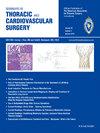Making the Transition From Cardiac Missions to Autonomous Heart Surgery at a Nigerian Teaching Hospital: Challenges and Lessons Learned
IF 2.5
3区 医学
Q2 CARDIAC & CARDIOVASCULAR SYSTEMS
Seminars in Thoracic and Cardiovascular Surgery
Pub Date : 2024-12-01
DOI:10.1053/j.semtcvs.2023.05.002
引用次数: 0
Abstract
Open-Heart Surgery at the Lagos State University Teaching Hospital commenced in 2004. Early years were based on a Cardiac Mission Model, but since 2017 the focus was on the transition to a Local Team Model with autonomous Open-Heart Surgery. The aim of this study is to describe our progress in making this transition, highlight lessons learned, and detail the outstanding challenges to be overcome. This study is a retrospective analysis of prospectively maintained data from the Lagos State University Teaching Hospital cardiothoracic database and Nigeria Open-Heart Surgery Registry between November 2004 and December 2021. Data extracted included patient demographics, EuroSCORE II, operative procedure, operative category, lead surgeon, complications, and outcomes. Over the study period, 100 operations were done over 2 time periods, 51 operations between 2004 and 2011 (Cardiac Mission Period) and 49 operations between 2017 and 2021 (Transition Period). In the Cardiac Mission Period, 21.6% of the operations were done by the Local Team and in the Transition Period this increased to 85.7% of the operations completed. Overall mortality was 14%, dropping from 17.6% in the Cardiac Mission Period to 10.2% in the Transition Period. The Local Team is now gradually taking on more diverse cases while striving to maintain good outcomes. Our institution has successfully made the transition from Cardiac Missions to Autonomous Open-Heart Surgery without an increase in mortality and a gradual increase in surgical volumes. Lessons learned included a strategy to focus on adult surgery, avoidance of high-risk cases, and moving from free surgery toward an appropriate cost structure for program sustainability. Contributory factors to the successful transition include the active support of the hospital management (provision of appropriate infrastructure and equipment, investment in training of the Local Team), continued humanitarian international collaborations focused on skill transfer, and maintenance of Local Team skills by collaborations with other active cardiac centers in Nigeria. Remaining challenges include financing to bridge equipment gaps, maintenance and replacement of equipment as well as the evolution of a national health insurance schema that would ideally support Open-Heart Surgery for Nigerian patients. Until that time, patients and programs must rely on supplemental funding of surgery to increase surgical volumes.
尼日利亚教学医院从心脏任务到自主心脏手术的转变:挑战和经验教训。
拉各斯州立大学教学医院的心脏直视手术于2004年开始。早期是基于心脏任务模型,但自2017年以来,重点是向具有自主心脏直视手术的本地团队模型过渡。本研究的目的是描述我们在实现这一转变方面的进展,强调所吸取的教训,并详细说明需要克服的突出挑战。本研究对2004年11月至2021年12月期间拉各斯州立大学教学医院心胸数据库和尼日利亚心脏直视手术注册中心的前瞻性数据进行了回顾性分析。提取的数据包括患者人口统计、EuroSCORE II、手术程序、手术类别、主刀医生、并发症和结果。在研究期间,在2个时间段内进行了100次手术,2004年至2011年(心脏任务期)进行了51次手术,2017年至2021年(过渡期)进行49次手术。在心脏任务期,21.6%的手术由当地团队完成,在过渡期,这一比例增至85.7%。总死亡率为14%,从心脏任务期的17.6%下降到过渡期的10.2%。当地团队现在正在逐步处理更多样化的案件,同时努力保持良好的结果。我们的机构已经成功地从心脏任务过渡到自主心脏直视手术,死亡率没有增加,手术量也没有逐渐增加。经验教训包括专注于成人手术的策略,避免高风险病例,以及从免费手术转向适当的成本结构,以实现项目的可持续性。成功过渡的因素包括医院管理层的积极支持(提供适当的基础设施和设备,投资培训当地团队),持续的以技能转移为重点的人道主义国际合作,以及通过与尼日利亚其他活跃的心脏病中心合作来保持当地团队的技能。剩余的挑战包括弥补设备缺口的资金、设备的维护和更换,以及国家医疗保险计划的发展,该计划将理想地支持尼日利亚患者的心脏直视手术。在此之前,患者和项目必须依靠手术的补充资金来增加手术量。
本文章由计算机程序翻译,如有差异,请以英文原文为准。
求助全文
约1分钟内获得全文
求助全文
来源期刊

Seminars in Thoracic and Cardiovascular Surgery
Medicine-Pulmonary and Respiratory Medicine
CiteScore
5.80
自引率
0.00%
发文量
324
审稿时长
12 days
期刊介绍:
Seminars in Thoracic and Cardiovascular Surgery is devoted to providing a forum for cardiothoracic surgeons to disseminate and discuss important new information and to gain insight into unresolved areas of question in the specialty. Each issue presents readers with a selection of original peer-reviewed articles accompanied by editorial commentary from specialists in the field. In addition, readers are offered valuable invited articles: State of Views editorials and Current Readings highlighting the latest contributions on central or controversial issues. Another prized feature is expert roundtable discussions in which experts debate critical questions for cardiothoracic treatment and care. Seminars is an invitation-only publication that receives original submissions transferred ONLY from its sister publication, The Journal of Thoracic and Cardiovascular Surgery. As we continue to expand the reach of the Journal, we will explore the possibility of accepting unsolicited manuscripts in the future.
 求助内容:
求助内容: 应助结果提醒方式:
应助结果提醒方式:


